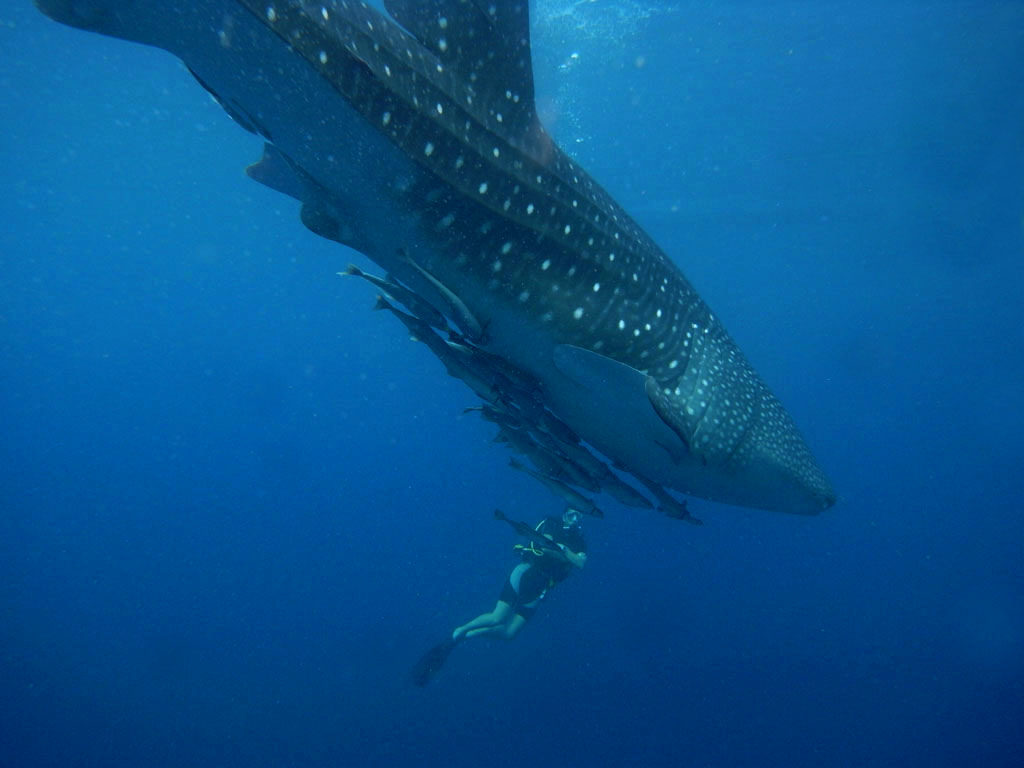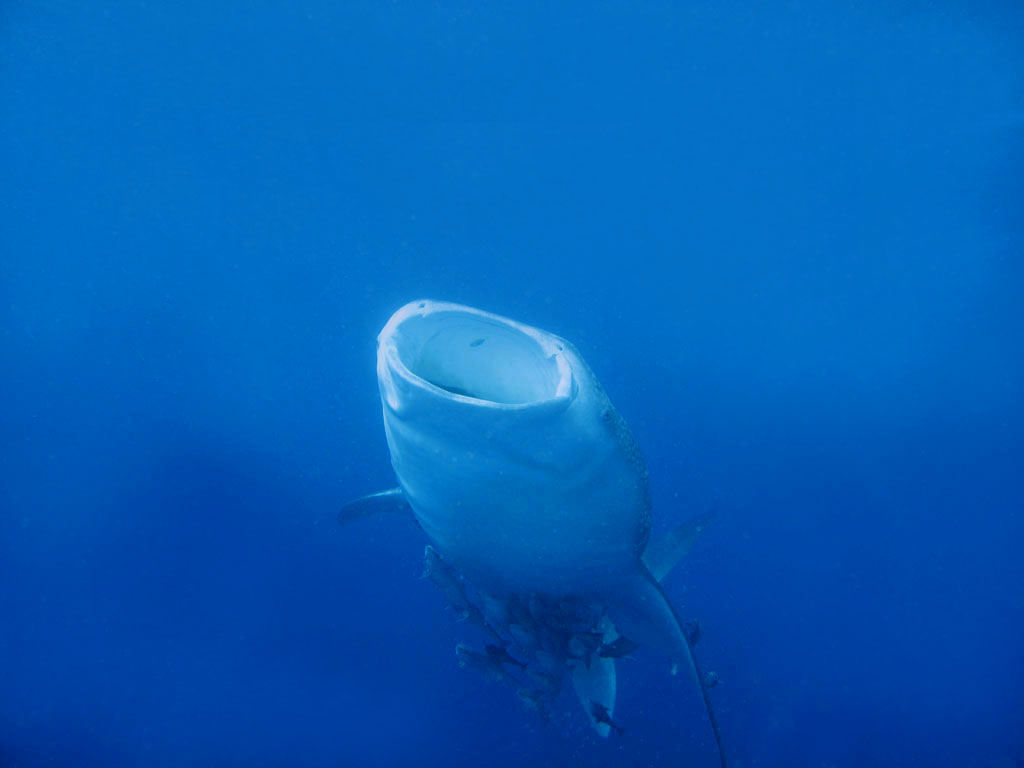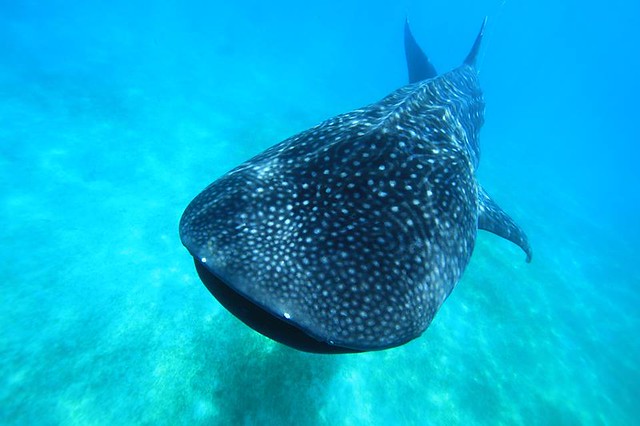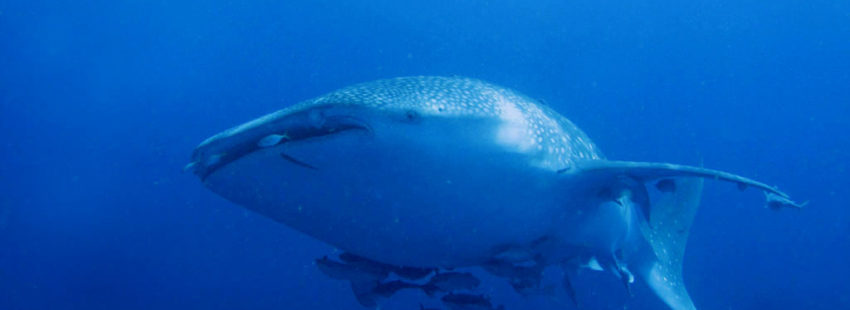http://e-info.org.tw/node/118011
3/4鯨鯊棲地在印尼 保育兩年後仍瀕危
文字大小
158 1 Share1
本報2016年8月29日綜合外電報導,姜唯編譯;蔡麗伶審校
明天(30日)是世界鯨鯊日。今年稍早,國際自然保育聯盟(IUCN)將鯨鯊的瀕危等級從易危升至瀕危。保育專家認為,擁有全球3/4鯨鯊的印尼,需要再加強保育工作,包括改善生態旅遊的管理、落實執法和補強立法。
全球有3/4的鯨鯊族群會出沒在印尼海域。圖片來源:取自我們的島。
數日不見鯨鯊 印尼政府大緊張
2013年,印尼將鯨鯊列為保育物種,希望能遏止鯨肉貿易,拯救鯨鯊免於滅絕。不過,此舉並未減緩鯨鯊減少的速度。鯨鯊並非印尼原生種,但有3/4的鯨鯊族群會出沒在印尼海域。
印尼漁業研究發展中心海洋生物學家達瑪迪(Dharmadi)對鯨鯊升級為瀕危表示不意外,因為鯨鯊成長至性成熟需要30年,「但牠們常常遭混獲或擱淺。」達瑪迪說。
東南亞國家很容易目睹鯨鯊。根據世界自然基金會印尼分會(WWF-Indonesia)的資料,今年初起,鯨鯊在蘇拉威西島東北部托米尼灣已被目擊17次,婆羅洲東海岸Talisayan約30次,爪哇東部龐越約20次。
印尼巴布亞地區鳥頭灣可能住著300隻鯨鯊。有些鯨鯊甚至在雅加達灣出沒。鯨鯊數量減少,也將衝擊鳥頭灣和托米尼灣的生態旅遊業。數日不見鯨鯊,已讓地方業者和政府感到緊張。
世界自然基金會印尼分會已開始和漁業部門合作,建立與鯨鯊接觸的指導原則。潛水客必須與鯨鯊保持一定距離,且禁止餵食或對牠們使用閃光燈。但是目前沒有任何具有法律效力的規範。
走私難防 海洋王國、皮包、健康食品花樣多
走私也是一大問題。鯨鯊的大鰭在東亞具有宗教目的,也被製成湯品。鯨鯊皮製成皮包,魚油則被製成健康食品。有時候不肖業者會走私整隻鯨鯊,送到中國長隆海洋王國等地。
中國福建廈門觀光飯店的展售櫥窗——鯨鯊背鰭——天九翅。攝影:柯金源。圖片來源:本報資料照。
今年稍早,印度官方救援了兩隻準備被走私到海外的鯨鯊。但最常見的鑽漏洞方式是將鯨鯊肉與其他魚肉混合,只能用DNA鑑定辨識。
印尼棲息著近200種鯊魚,只有鯨鯊受到法律保護。需求最高的鯊魚,像鎚頭鯊和遠洋白鰭鯊僅有禁止出口的法令保護。
此外,猩猩和老虎等陸上保育動物受1990年保育法保護,走私最高刑期五年,但鯨鯊歸2004年漁業法規範,違反法令只需罰鍰。
【相關文章】
【參考資料】
- Mongabay(2016年8月23日),Indonesia must do more to protect whale sharks, conservationists say
- Most whale sharks live in the Indo-Pacific, where Indonesia lies.
- The giant fish is a protected species in Indonesia, but that hasn't stopped poachers from hunting it for its fins, skin and oil.
- Advocates want the Indonesian government to crack down on traffickers and do more to promote sustainable ecotourism that contributes to the creature's conservation.
In 2013, Indonesia declared the whale shark a protected species, hoping to put a dent in the thriving trade in its body and parts which was pushing the world’s largest fish toward extinction.
The new distinction failed to halt an alarming decline in its numbers. Earlier this year, the whale shark (Rhincodon typus) was uplisted from Vulnerable to Endangered on the IUCN Red List.
Now, conservationists are saying Indonesia must do more to protect the school bus-sized creature, including through improved ecotourism management, law enforcement and legal protection.
The whale shark is not endemic to Indonesia, a sprawling archipelago whose seas span one-eighth of the world’s circumference. But three-fourths of whale shark populations occur in the Indo-Pacific, where Indonesia lies.
That the whale shark had become endangered did not surprise Dharmadi, a marine biologist from the government’s Center for Fisheries Research and Development. The slow-growing fish takes 30 years to reach sexual maturity. “And they often get caught accidentally or stranded in coastal areas,” he told Mongabay.

Whale sharks are spotted regularly across the Southeast Asian country. Since the beginning of this year, there have been 17 sightings in the Gulf of Tomini, in the northeast part of Sulawesi island; around 30 sightings in Talisayan, off Borneo’s eastern coast; and around 20 sightings in Probolinggo, in eastern Java, according to WWF-Indonesia. Around 300 whale sharks are thought to live in Cenderawasih Bay, in Indonesia’s Papua region. Some whale sharks have even appeared in Jakarta Bay.
Ecotourism development has begun in Cenderawasih and Tomini. Exploring the secluded Cenderawasih Bay National Park requires a boat, not to mention an expensive flight to Papua for outsiders. By contrast, the entry ticket in Tomini’s Botubarani village costs just 15,000 rupiah ($1.10). That site has seen 30,000 visitors in the past three months, according to Cassandra Tania, marine species officer at WWF-Indonesia.
Shrinking populations, though, could jeopardize these enterprises.
“It has already been a few days that whale sharks have not been seen at Botubarani and the local government is starting to panic,” Tania said.
WWF-Indonesia has worked with the fisheries ministry to establish guidelines for proper conduct around the whale sharks. Divers must keep some distance from the creatures and are prohibited from feeding them or shining flashlights in their direction. But there has yet to be any legal directive, Tania said.
Ecotourism will be a subject for discussion at the IUCN World Conservation Congress in September, along with action plans for shark and ray management and the conservation status of other shark species.

Trafficking is also a major problem. The whale shark’s huge fins are popular in East Asia for spiritual purposes, and they are also used in shark fin soup. Their skin can be turned into bags, their oil into health supplements.
Sometimes the creatures are even trafficked whole, destined for theme parks like China’s Chimelong Ocean Kingdom. Earlier this year, Indonesian authorities rescued two whale sharks from traffickers who meant to sell the creatures abroad.
“This is the first time we’ve managed to get live [whale sharks] because they’re usually [cut] into pieces already,” said Irma Hermawati, legal advisor for the Wildlife Conservation Society’s Wildlife Crime Unit, which assisted in the operation.
The most common trick is to mix whale shark meat with that of other fish, making it difficult to differentiate without using a DNA test, said Hermawati.
Indonesia is home to roughly 200 shark species, but only whale sharks are protected by law. For the most in-demand species, like the hammerhead (Sphyrnidae) and the oceanic whitetip (Carcharhinus longimanus), only an export ban is in place.
Furthermore, while terrestrial protected animals like orangutans and tigers are subject to the 1990 Conservation Law, which stipulates a maximum penalty of five years imprisonment for traffickers, creatures like the whale shark or subject to the 2004 Fisheries Law, which only stipulates a fine.




沒有留言:
張貼留言